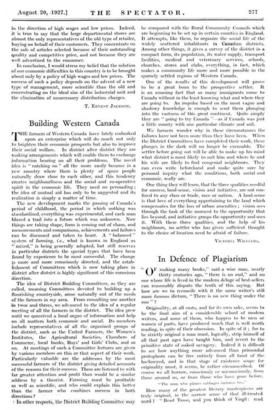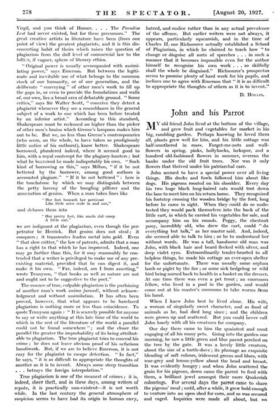In Defence of Plagiarism
F making many books," said a wise man, nearly thirty centuries ago, " there is no end," and no one whose life is lived in the modern deluge of best-sellers can reasonably dispute the truth of this saying. But how are we to reconcile with it the same writer's still more famous dictum, " There is no new thing under the sun " ?
"0
Originality, at all costs, and for its own sake, seems to be the final aim of a considerable school of modern writers, and some of them, who happen to be men or women of parts, have produced much that is well worth reading, in spite of their obsession. In spite of it ; for to be strictly original a man must, logically, strip himself of all that past ages have taught hiM, and revert to the primitive state of naked savagery. Indeed it is difficult to see how anything more advanced than primordial protoplasm can be free entirely from all taint of the hackneyed, and in that stage of existence scope for originality must, it seems, be rather circumscribed. Of course we all borrow, consciously or unconsciously, from those around us, or from those who have gone before.
"The man who plants cabbages imitates too."
How many of the greatest literary masterpieces are trniv original, in the narrow sense of that ill-treated word ? " Refid Tasso, and you think of Virgil : read Virgil, and you think of Homer. . . . The Paradise Lest had never existed, but for these precursors." The great creative artists in literature have been (from one point of view) the greatest plagiarists, and it is this dis- concerting habit of theirs which raises the question of plagiarism from the dull level of commercial law to the lofti !r, if vaguer, sphere of literary ethics. " Original power is usually accompanied with assimi- lating power," says Emerson. But between the legiti- mate and inevitable use of what belongs to the common stock of our humanity, or of our generation, and the deliberate " conveying " of other men's work to fill up the gaps in, or even to provide the foundations and walls of, our own, lies a broad area of debatable ground. " Some critics," says Sir Walter Scott, " conceive they detect a plagiarist whenever they see a resemblance in the general subject of a work to one which has been before treated by an inferior artist." According to this standard, Shakespeare must be reckoned no higher than the picker of other men's brains which Greene's lampoon makes him out to be. But we, no less than Greene's contemporaries (who seem, on the whole, to have taken so prodigiously little notice of his outburst), know better. Shakespeare borrowed, plundered indeed, where it seemed good to him, with a royal contempt for the plagiary-hunters ; but what he borrowed he made indisputably his own. " Such kind of borrowing as this," says Milton, " if it be not bettered by the borrower, among good authors is accounted plagiary." " If it be not bettered " : here is the touchstone by which we may distinguish between the petty larceny of the bungling pilferer and the annexation of genius. When a man takes lines like
"Her feet beneath her petticoat Like little mice stole in and out,"
and debases them into
"Her pretty feet, like snails did creep A little out,"
we are indignant at the plagiarism, even though the per- petrator be Herrick. But genius does not steal ; it conquers ; it transmutes leaden metal into gold. Even " that slow critter," the law of patents, admits that a man has a right to that which he has improved. Indeed, one may go further than this, for it may reasonably be con- tended that a writer is privileged to make use of any pre- existing material, provided that he can digest it, and make it his own. " Far, indeed, am I from asserting," wrote Tennyson, " that books as well as nature are not and ought not to be suggestive to the poet." The essence of true, culpable plagiarism is the purloining of another man's work animo furandi, without acknow- ledgment and without assimilation. It has often been proved, however, that what appears to be barefaced plagiarism is nothing more or less than coincidence. To quote Tennyson again : " It is scarcely possible for anyone to say or write anything at this late time of the world to which in the rest of the literature of the world a parallel could not be found somewhere " ; and the closer the parallel the greater the improbability of its being attribut- able to plagiarism. The true plagiarist tries to conceal his crime ; he does not leave obvious proof of his nefarious handiwork. But, if we are to believe Emerson, it is not easy for the plagiarist to escape detection. " In fact," he says, " it is as difficult to appropriate the thoughts of another as it is to invent. Always some steep transition . . . betrays the foreign interpolation." True plagiarism is one of the meanest of crimes ; it is, indeed, sheer theft, and in these days, among writers of repute, it is practically non-existent—it is not worth while. In the last century the general atmosphere of suspicion seems to have had its origin in human envy, hatred, and malice rather than in any actual prevalence of the offence. But earlier writers were not always, it appears, particularly squeamish, and in the time of Charles II. one Richsource actually established a School of Plagiarism, in which he claimed to teach how " to change or disguise all sorts of speeches . . . in such a manner that it becomes impossible even for the author himself to recognize his own work . . . so skilfully shall the whole be disguised." Richsource's prospectus seems to promise plenty of hard work for his pupils, and inclines one to agree with Emerson that " it is as difficult to appropriate the thoughts of others as it is to invent."
D. HOLLIS.



































 Previous page
Previous page